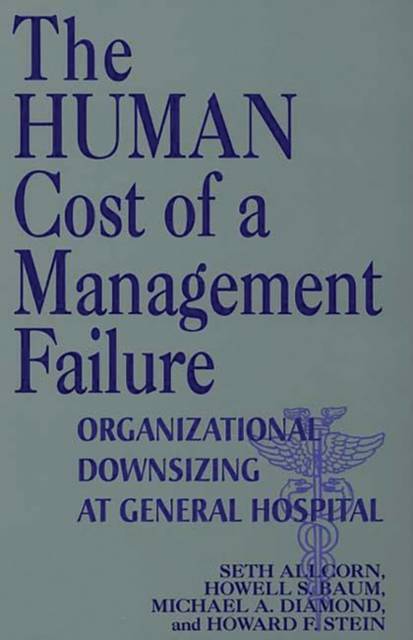
- Afhalen na 1 uur in een winkel met voorraad
- Gratis thuislevering in België vanaf € 30
- Ruim aanbod met 7 miljoen producten
- Afhalen na 1 uur in een winkel met voorraad
- Gratis thuislevering in België vanaf € 30
- Ruim aanbod met 7 miljoen producten
The Human Cost of a Management Failure
Organizational Downsizing at General Hospital
Seth S Allcorn, Howard F SteinOmschrijving
This book presents a unique, in-depth examination of the effects that the popular approaches to management organizational change--downsizing, restructuring, and reengineering--had on a major American hospital. The Human Cost of a Management Failure shows what can happen when management insists on accomplishing its ends strictly by the numbers. The authors ask why top management so often, and with seemingly such a cavalier attitude, selects downsizing and similar methods when research indicates that they are all too often such poor choices. Based on a year-long longitudinal study, Allcorn, Baum, Diamond, and Stein report on their interviews with 23 senior and mid-level hospital administrators, then interpret their findings from a psychoanalytic perspective, to make clear that the human side of the workplace can only be ignored at great risk when change is contemplated and then implemented. This is essential reading not only for corporate management, but also for other professionals and academics throughout the social and behavioral sciences.
Readers of The Human Cost of a Management Failure are oriented to the literature on downsizing, restructuring and reengineering, and to the context of the study. Case material follows, enabling readers to draw their own conclusions with regard to the nature of the organizational change and its effects upon the hospital's employees, and consultants offer their own viewpoints. An update of events at the hospital after the study was conducted is provided along with summaries by each author of his own interpretation and how he interprets the others' views. In this way, readers will get an unusual opportunity to evaluate their own viewpoints against those of the psychoanalytically trained researchers, and to decide for themselves whether there are, in fact, better ways to make an organization economically competitive in the marketplace.Specificaties
Betrokkenen
- Auteur(s):
- Uitgeverij:
Inhoud
- Aantal bladzijden:
- 304
- Taal:
- Engels
Eigenschappen
- Productcode (EAN):
- 9781567200027
- Verschijningsdatum:
- 20/03/1996
- Uitvoering:
- Hardcover
- Formaat:
- Genaaid
- Afmetingen:
- 156 mm x 234 mm
- Gewicht:
- 594 g

Alleen bij Standaard Boekhandel
Beoordelingen
We publiceren alleen reviews die voldoen aan de voorwaarden voor reviews. Bekijk onze voorwaarden voor reviews.











